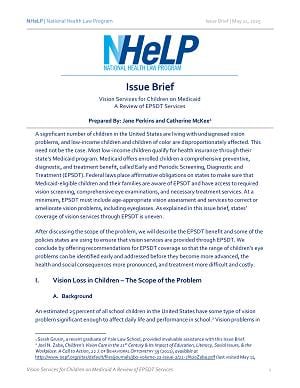By: Jane Perkins and Catherine McKee


Executive Summary
A significant number of children in the United States are living with undiagnosed vision problems, and low-income children and children of color are disproportionately affected. Most low-income children qualify for health insurance through their state’s Medicaid program. Medicaid offers enrolled children a comprehensive benefit, called Early and Periodic Screening, Diagnostic and Treatment (EPSDT). At a minimum, EPSDT must include age-appropriate vision assessment and services to correct or ameliorate vision problems, including eyeglasses. After discussing the scope of the vision problem, this issue brief describes the EPSDT benefit and policies states are using to ensure that vision services are provided through EPSDT. The brief also offers recommendations for EPSDT coverage so that the range of children’s eye problems can be identified early and addressed before they become more advanced, the health and social consequences more pronounced, and treatment more difficult and costly.
